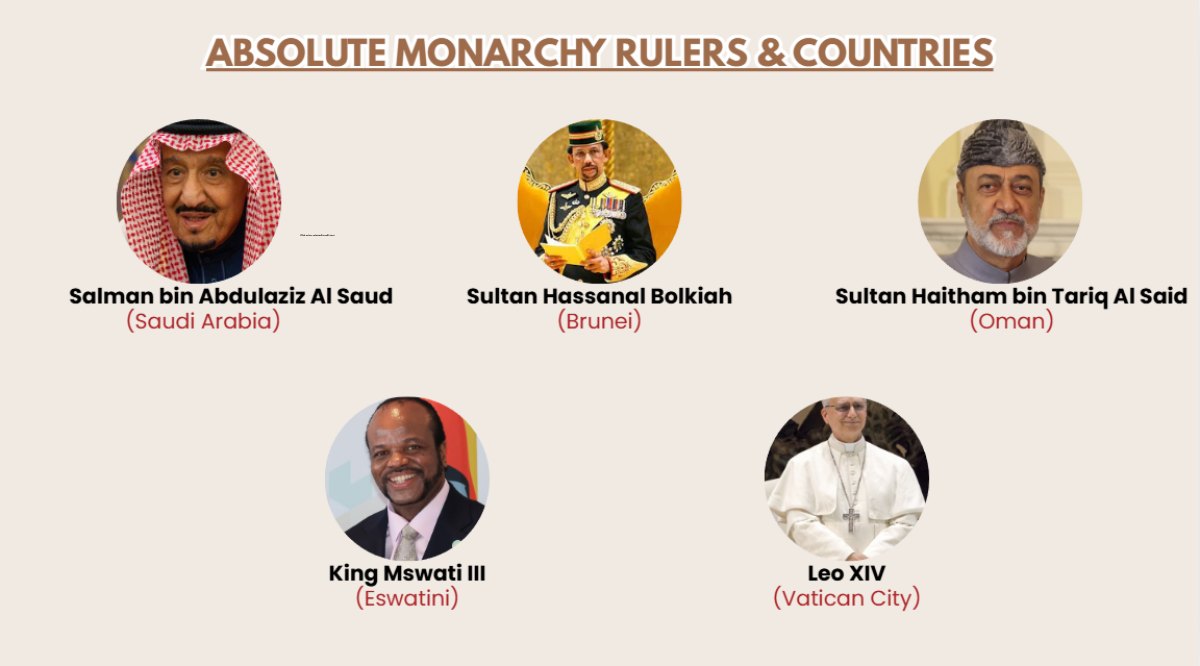Countries with absolute monarchy: In today’s world, most countries follow democratic systems where people elect their leaders. But a few nations still follow an old form of government known as an absolute monarchy, where one person, usually a king or queen, holds all the power. In an absolute monarchy, the ruler’s word is law. They make all major decisions about the government, the economy, and even people’s rights, without needing approval from a parliament or the public.
While this might sound like something from history books, absolute monarchies still exist in the modern world. These countries have royal families that have ruled for generations, and their traditions continue to shape national life. Some rulers are deeply involved in governance, while others blend traditional power with limited modern reforms.
Check out: List of Landlocked Countries in the World
Countries with Absolute monarchies
Let’s take a look at the few remaining nations where kings or sultans still hold absolute control in the 21st century:
| Country | Monarch Name |
| Saudi Arabia | Salman bin Abdulaziz Al Saud |
| Brunei | Sultan Hassanal Bolkiah |
| Oman | Sultan Haitham bin Tariq Al Said |
| Eswatini | King Mswati III |
| Vatican City | Leo XIV |

1. Saudi Arabia
Saudi Arabia is a prime example of an absolute monarchy, meaning the ruling House of Saud, led by the King, holds total and unchallengeable power over every aspect of the nation. Unlike most modern countries, it operates without a formal written constitution or an elected parliament to limit the King's authority. Instead, the government's foundation is rooted in the Quran and Sharia law, and the royal family maintains complete control over all major decisions, including the vast economy and national security, ensuring that their rule is final and absolute.
2. Brunei
Brunei is a small, wealthy nation in Southeast Asia where Sultan Hassanal Bolkiah maintains complete, absolute control. He has ruled since 1967 and acts as both the head of state and head of government, meaning there are no political parties or elections to challenge his authority. The nation's wealth comes almost entirely from its oil and gas reserves, which in turn allows the Sultan to provide generous benefits to the citizens, such as free healthcare and education, and notably, no income tax.
3. Oman
Oman is an absolute monarchy led by the Sultan, who holds complete and final authority over all military and political matters. The country's unique government structure includes an advisory council, but this council serves only to offer advice and cannot make laws or challenge any decisions made by the Sultan. Known for its stable society, Oman uses its wealth to modernize its nation while carefully preserving its deep-rooted traditional Arabian culture.
4. Eswatini (Swaziland)
Eswatini (formerly Swaziland) holds the distinction of being Africa's last absolute monarchy, where King Mswati III possesses near-complete authority over the country's government, legal system, and armed forces. The King effectively eliminates political opposition by banning political parties and personally appointing the prime minister and most other government officials. Despite facing international criticism regarding human rights and governance, the monarchy remains a central and deeply entrenched fixture of Eswatini’s traditional culture and way of life.
5. Vatican City
Vatican City is a unique type of absolute monarchy because it's ruled by the Pope, who currently is Leo XIV, who functions as both the head of state for the country and the supreme spiritual leader of the global Roman Catholic Church. This makes it an absolute government in the sense that the Pope wields supreme, unchallengeable authority over all of the state's legal, administrative, and governmental affairs, with no other body or constitution limiting his control.
Conclusion
While the vast majority of the world has adopted democratic or constitutional systems, these five nations, Saudi Arabia, Brunei, Oman, Eswatini, and Vatican City, stand as notable exceptions where an absolute monarchy still prevails. In each case, a single monarch holds supreme and unchallengeable authority over the government, the law, and all major decisions.
Whether sustained by immense oil wealth or deeply rooted religious and cultural traditions, these countries represent a persistent, older form of governance where the ruler's word remains the ultimate law.
Comments
All Comments (0)
Join the conversation